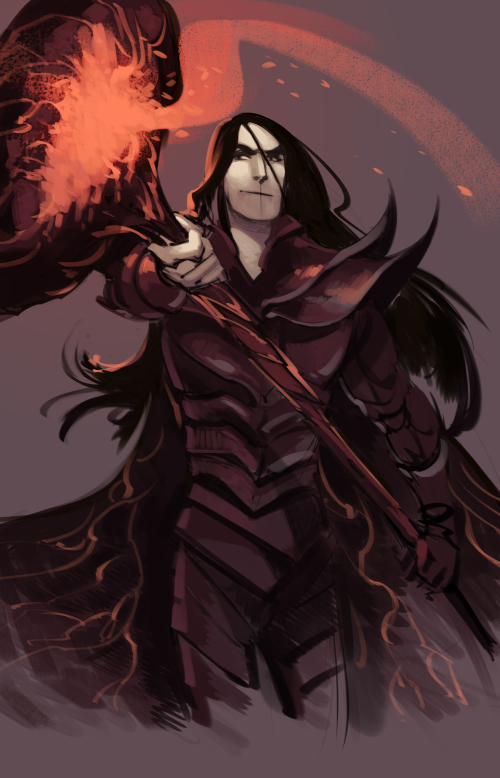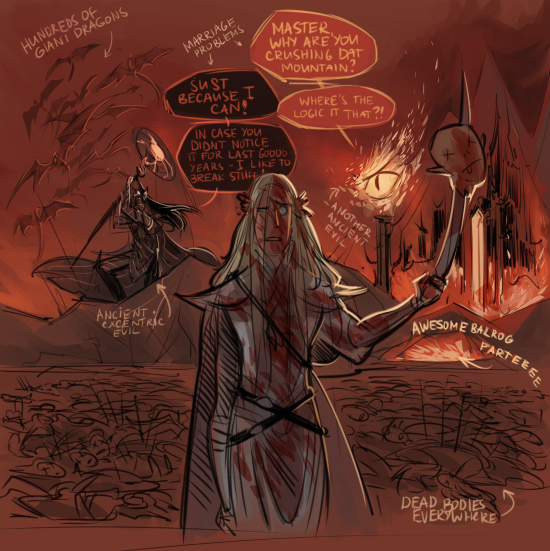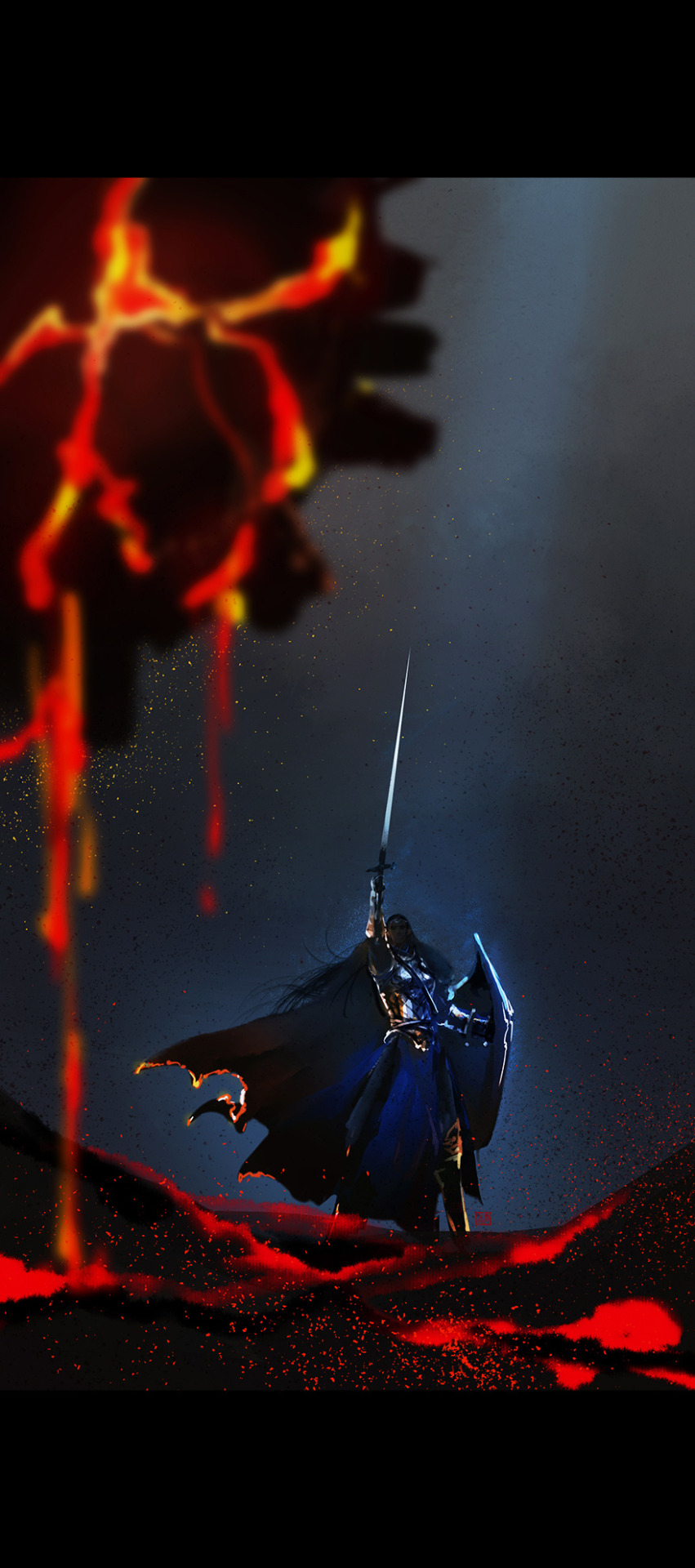I promise you, by the end of this, you’re going to want to read this book of pure drama. This would probably be better suited as a Top 10 post, but I thought a discussion would be nice to really get into the nitty gritty of why I loved The Silmarillion so damn much. And, ICYMI, last week we chatted about the 100% rhetorical question of is Samwise Gamgee really the best? I mean, DUH. Also, so I don’t have to explain every single name that shows up in this post, here’s the primer I wrote for all things elves last week! Annnnnd, if you’re super curious, here’s my original review of this damn book.
This week, though, we’re going to take it back, waaaaaaay back, to the first piece of Middle-earth history that Tolkien ever started working on, something that he wrote for literally his entire life and still never completed. The Silmarillion was published posthumously by one of my personal heroes, Christopher Tolkien, who passed away last Thursday, and this quote from his son, Simon, says it all:
Over the two decades after Tolkien’s death, he [Christopher] published The Silmarillion, Unfinished Tales, and The History of Middle-earth. “It’s enormously to my father’s credit that he took on that huge task. I remember the crate-loads of papers arriving at his home, and no one could be in any doubt at the scale of the work he had taken on.”
The Guardian

If you’re reading this post right now, it’s probably because you’ve either read The Lord of the Rings, and/or you’ve seen the movies. It’s because you want to know a little bit more, but that little bit more is scary. My father, who introduced me to Middle-earth, is infamous for having thrown away his copy of The Silmarillion. He literally threw it in the trash. There are countless people out there who will tell you it’s confusing, it’s over the top, and it’s not worth it.
And yet.
And yet, it was on my Top 10 reads of 2019. Why? Is it really worth it?
(Spoiler: the answer to this obnoxiously long rant is an emphatic YES.)
I first read The Silmarillion last summer. I was just beginning an insane project. An Adventure in Tolkien aims to read everything Tolkien ever wrote about Middle-earth, and I thought it best to start with where it all started. I was truly not prepared for how deeply this book was going to sink its hooks into me.
It begins innocent enough. There are two short stories—Ainulindalëand Valaquenta. They describe the birth of Middle-earth (like, the planet), the creation of the pantheon of gods and goddesses, and go into what each of them look like, what they’re responsible for, and what their kind of specific power is. IE: Ulmo is Poseidon.
I was starting to wonder why my dad was so up in arms about this book. This was no big deal, I thought. Yes, it’s written in a higher style of writing, and yes, it’s a bit stuffy, but so isn’t LOTR. Really, if you want something chill, read The Hobbit.
I had no idea what I was in for.

The actual meat of The Silmarillion is, at times, very serious. It’s dealing with the attempted destruction of an entire people. Not just one race, but everyone. The villain wants to see Middle-earth burn.
Fun fact: I’ve already got a shit-eating grin on my face because oh that villain. Oh boyyyyyy.
The Silmarillion, for me, is a lot like yoga. Most people consider it a very sacred, serious practice. And that’s fine. You do you. I respect the hell out of that.
Yoga for me? I’m here to have a good time. I like loud music, weird shapes, and to sweat. I like to laugh, to fall over, and to try something new. I do meditation, as well, and oftentimes, when I take class in a studio, it’s slow and gentle. But when I teach, or when I’m at home practicing, it looks like something straight out of a club. I am ready to boogie.
Sometimes, I think I probably misunderstood The Silmarillion, or like something happened in my brain while I was reading, and I read an entirely different book from the rest of the world, but then:

Art by Phobs
I’m reminded that art like this exists, and I know.
We all read the same book. Some of you just decided to take it at its face value of high brow literature, which it is, you’re definitely reading it the right way. There’s just also some of us, maybe the ones that like to also kick ass in yoga, that think it’s downright hilarious. I’m not even truly saying there’s a right and a wrong way to read this insane book, but I am saying that Melkor, the eventual villain, got a damn name change to Morgoth, which literally means Black Foe of the World. (Don’t even get me started on the whole Shivering Waterfall or whatever its dumbass name is.)
If you’ve ever wondered why elves are drama queens, it’s because Tolkien was The Drama Queen, first and foremost.
I like to call them Drama Elves because of a few reasons:
- When Fëanor, the elf responsible for literally half of all the bad things that happen (Morgoth’s responsible for the other half), needs some ships to cross a river to get to wherever he needs to get to in order to murder some more people, and the owners of those ships refuse him, he kills all of them, steals the ships, and then burns the ships so that no one else can use them.
- If they get super sad, like way sadder than is even kind of normal, instead of trying to figure out why they’re sad, they just die.
- Wait, we’re back to Fëanor the Disaster. When he inevitably dies (spoiler: about 1% of the characters actually survive), he can’t let his sons take his body back to be buried because he wants to be able to curse Morgoth with his last breath, so as they’re about to carry him back, he bursts into flames and his ashes float away on the wind.
- Lúthien was once super pissed at her dad (rightfully) after he locked her up in a wooden tower (for her “safety”), so she sang a magic song to grow her hair insanely long until it essentially burst the wood open, and she was able to escape.
- She also sang Morgoth to sleep so that Beren could steal a Silmaril.
- Speaking of singing! When Maedhros was captured by Morgoth (ya jerk), Fingon was so bereft that he snuck into Angband by himself, scaled the tallest mountain in the world, and sang a song so full of sorrow that all of Angband wept. And then, like, cut off Maedhros’ hand so he could save him.
Oh my Ilúvatar, I could go on for ages, we gotta stop.

Art by Gem
It really is ridiculous, though, and if you don’t believe me, it’s time for Morgoth.
Alright, so you’ve got God, and Lucifer says, “I don’t like humans, they’re dumb,” and God’s like, “Wow, fuck you, byyyyyyye,” and throws him out of Heaven. Lucifer falls to Hell, and when he gets there, he’s like, “Holy shit, I’m alone, you know what would be great?”

Art by Phobs
Okay, so you’ve got Aulë, and Melkor says, “All of these creatures that were created are kind of helpless, should we maybe give them a hand?”, and Aulë’s like, “Wow, fuck you, byyyyyyye,” and agrees with the rest of the pantheon that they should banish him and then give him a new name to fit with his bastard idea. Now renamed Morgoth, he flees from the Undying Lands into Middle-earth, seeks out a little dark corner that he’ll eventually call Angband, and pauses to take a deep breath. “Okay,” he says, “First order of business: fuck all their shit up.”
Things Morgoth does immediately after being kicked out and renamed:
- Roundhouse kick all the lights down so the world is flooded with darkness.
- Coerce a giant ass spider into letting him ride it across the world so that he looks fearsome when he comes to steal some pretty rocks.
- Literally seduce (Tolkien’s word, not mine) one of Aulë’s most prized apprentices to come to his side. (Morgoth’s like, “I don’t have cookies, but I do have a giant spider that hates me, some pretty rocks that’ll piss a bunch of elves off, and a throne. Mairon’s like, “Sick, where do I sign?”)
- Waits for the Valar to declare war, and then is like, “YOU KNOW WHAT’S AWESOME? DRAGONS COVERED IN ARMOR!”

Art by Phobs
Guys, I’m not making this up. Also, I really intended for this to be, like, a studious look at why The Silmarillion is awesome and worth reading, but, as I also completely expected, it’s fallen apart and turned into me shouting and swearing. Which, like, is indicative of the story within, I think.
Because, look. Here’s the deal. Even if you’ve only watched the movies, we’ve all got the same ideas of what elves are like. They’re ethereal. They wear loose, floaty clothes, and when they get all magical, their clothes change (Drama Elves) into something looser and floatier, and they start glowing. They’ve got long hair and fine features and they don’t talk a whole heck of a lot.
In The Silmarillion?

Art by Phobs
Literally bloodthirsty. After Morgoth steals the Silmarils, Fëanor’s like, “Fine, well then I’m pledging an oath that I’ll have revenge on you, and all of my bloodline is bound by this oath upon pain of death.” (Spoiler: all but one of the Fëanorians end up dead because of this oath, and we’re not even really sure that one actually lived.) The sheer amount of kinslaying that goes on in this book is out of control. Elves are ethereal, sure, but they’ll also cut you off at your knees with a beautifully crafted blade.
I’m not saying Fingolfin is the best of Finwë’s sons, but he did ride off into single combat against Morgoth because he was tired of the bloodshed and figured he’d better take matters into his own hands, and he did wound Morgoth so badly that Morgoth felt it for the rest of his eternal life.
Like, Silmarillion-era elves are ready to kill everyone that stands in their way, but only if it can be in the most dramatic and bloodiest way possible. They are straight up crazy, and it’s awesome. The Silmarillion is, in part, so excellent because it completely smashes all of the expectations you have about Middle-earth. Elves are beautiful? Yeah, duh, but they’re also murderous. Sauron’s bad? Well, obviously, but Morgoth also unleashed a dragon, Ancalagon, that made Smaug look like a butterfly.
Okay, but Mary, you’re saying, all of this is great, and a lot of it is making me laugh, but you’re no really selling me on whether or not The Silmarillion is worth it.
The argument is that Sam is actually the hero of LOTR, right? He’s the one that gets Frodo to Mordor, the one that literally carries him up Mount Doom, the one that convinces him to throw it in the fire. Without Sam, all of Middle-earth would still be at war, at best, or completely destroyed, at worst. Whatever Tolkien says about hating allegories, there is a lesson to be learned here. It doesn’t matter how small you are, or how little you think you have to contribute to the world—you can change everything.
Morgoth is the worst of all evils. He honestly puts Sauron to shame. He’s so powerful that when, inevitably, he’s defeated, they can’t kill him like they do Sauron. The best they can do is forever banish him. And while that works, technically, when all evil is defeated at Sauron’s death, Morgoth is still alive. He’s banished, and he’s in some kind of Sleeping Beauty eternal slumber, but he was never killed.
And yet, every single person in the world, no matter if they’re bloodthirsty elves that just want their jewels back or not, comes together to defeat the evil hellbent on destroying their world.
Yes, I love Morgoth, I think he’s a superb villain, but what really gets me in this story is Fingolfin riding into single combat.

Art by yidanyuan
I mean, think about it. All of your people are dying. Your family is being picked off one by one by this stupid oath your brother took. The world is burning. So you get on a horse, your banner flying in the wind behind you, and you march into Angband, which is a more terrible version of Mordor, by yourself, to challenge the Black Foe of the World to single combat. You know that you’re going to die, but something has to be done, and no one else is stepping forward, so it’s up to you, a single person, to stand up to something you know is wrong.
I can shout at you all day about how funny The Silmarillion is (and it really, truly is), but, at the end of the day, I love it so much because of characters like Fingolfin. I love it because Fingon goes into Angband and scales the tallest mountain in the world because he loves Maedhros so much that he’s willing to risk his life on the off-chance that he might save his best friend. I love it because Ecthelion willingly gave his life fighting the king of balrogs so that Glorfindel could help evacuate Gondolin and save hundreds of people. I love it because, in the face of the worst thing they’re ever going to go up against, the characters in The Silmarillion keep getting up. They keep trying to defeat Morgoth. They keep saying no to evil and yes to a better world. They’re determined to see that better world come to fruition, even if it means their lives.
Sure, even beneath all that, there are still stupid bits. They are, after all, fighting a war over three crystals. Maedhros continues on with Fëanor’s oath even though everything in him is screaming at him to stop and his entire family is dead, but pride comes first. Fëanor is literally The Worst.
But again, LOTR’s got those bits, too. They’re fighting a war over a single ring. Boromir is determined to get that ring for Gondor and refuses to listen to Aragorn because his pride gets in the way. (I love Boromir, don’t come at me in the comments.) Denethor is literally The Worst.
Even The Hobbit has them! They’re fighting a war over the hoard of gold in Erebor. Thranduil refuses to help anyone because he’s a Grade A Snob. Thorin is literally The Worst.
But we love both of these stories so much because there’s something deeper beneath them, and The Silmarillion has all of those deeper reasons, too. It may be long and convoluted, but, at its heart, it carries the same message of strength and resilience and small efforts meaning powerful changes.
In the end, The Silmarillion is worth it for a lot of reasons. It’s hilarious. The elves are dramatic and obnoxious to a fault. There’s so much lore packed into it. If you’ve ever wondered about the ages before LOTR, this has it all. There’s magic and battles and an incredible cast of characters. It’s well written, and it’s got the most extensive history and research poured into it. It’s Tolkien’s life’s work, and it has his entire soul in it. And it’s powerful. It gives me hope for a better world.
I won’t lie to you, it’s difficult to get through at times, and all of your favorite characters are going to die, but it’s the little moments, like when Elrond says “this is Glamdring of Gondolin” about the sword Gandalf’s found in The Hobbit, that make it worth it because, suddenly, you know what all of that means, and it carries such a bigger story than just being a sword, and you have to pause in memory of Gondolin’s fall.

Art by Phobs
I guess, what I’m trying to say is that there are a lot of reasons why The Silmarillion is worth it. I went in for the history, and I found more laughter than I’d ever imagined along the way, and for me, the pure joy I felt while reading is always going to be worth the adventure.

Leave a comment